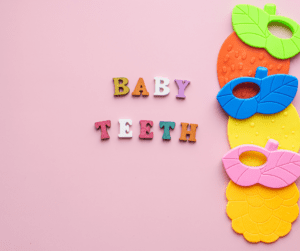Importance of Baby Teeth- How to look after Baby teeth


The smile of a child is a delightful sight, and those tiny pearly whites play a crucial role in their overall development. Baby teeth, also known as primary teeth or deciduous teeth, serve as placeholders for the permanent teeth that will eventually replace them. While they may seem temporary, baby teeth have several important functions that contribute to a child’s oral health and overall well-being. In this blog, we will explore the significance of baby teeth and why they deserve proper care and attention.
Every child goes through the stage of having baby teeth, which typically start to appear around six months of age. These primary teeth may be small, but they have a big impact on a child’s oral health and development. Understanding their importance is key to ensuring proper dental care and setting the foundation for lifelong oral hygiene habits.
What are Baby Teeth?
Baby teeth are the first set of teeth that emerge in a child’s mouth. They consist of 20 teeth in total, including four central incisors, four lateral incisors, four canines, and eight molars. These teeth begin to erupt between six months and one year of age, gradually filling up the child’s mouth and helping them bite, chew, and speak.
The Role of Baby Teeth in Development
Chewing and Digestion
Baby teeth play a crucial role in the chewing and digestion process. As infants transition from a liquid-only diet to solid foods, their baby teeth enable them to bite and grind food, making it easier to swallow and digest. Proper chewing helps ensure that children receive adequate nutrition from a variety of food sources.
Speech Development
Another vital role of baby teeth is in the development of speech. These teeth help children pronounce words clearly, as they provide support for the lips and tongue. Without their baby teeth, children may struggle with proper pronunciation, which can affect their communication skills and confidence.
Proper Alignment of Permanent Teeth
Baby teeth act as space maintainers for the permanent teeth that will replace them. They hold the positions in the jawbone and ensure that the permanent teeth erupt in their proper places. If baby teeth are lost prematurely due to decay or other issues, neighbouring teeth can shift, potentially leading to alignment problems and the need for orthodontic treatment later in life.
Baby Teeth and Self-Esteem
Baby teeth are essential for a child’s self-esteem and confidence. A healthy smile contributes to a positive self-image and social interactions. Children with dental issues or missing teeth may feel self-conscious, which can impact their overall well-being. By promoting good oral health habits and taking care of baby teeth, parents can help their children maintain a healthy smile and boost their self-esteem.
Common Dental Issues in Baby Teeth
Baby teeth are susceptible to various dental problems, just like permanent teeth.
Tooth decay, also known as cavities, is one of the most common issues affecting baby teeth. Poor oral hygiene, sugary foods and drinks, and a lack of fluoride can contribute to tooth decay. Additionally, baby bottle tooth decay can occur when infants are frequently exposed to sugary liquids, such as milk or juice, in their bottles or Sippy cups.
Another common dental issue in baby teeth is early tooth loss. This can happen due to accidents, severe tooth decay, or certain medical conditions. Early tooth loss can disrupt the natural progression of dental development, potentially leading to problems with speech, chewing, and the alignment of permanent teeth.
CARING FOR BABY TEETH
Establishing a Dental Care Routine
Caring for baby teeth begins even before they emerge. Parents should gently clean their baby’s gums with a soft cloth or infant toothbrush after feedings. Once teeth start to erupt, a small, soft-bristled toothbrush should be used to clean them. Brushing should be done twice a day with a smear of toothpaste.
Healthy Eating Habits
A balanced diet plays a significant role in maintaining the health of baby teeth. Limiting sugary snacks and drinks can help prevent tooth decay. Encouraging a diet rich in fruits, vegetables, whole grains, and dairy products provides essential nutrients for strong and healthy teeth.
Avoiding Prolonged Bottle Feeding and Pacifier Use
Prolonged bottle feeding or excessive use of pacifiers can contribute to dental issues, such as tooth decay or improper alignment. It is recommended to transition infants to cups by their first birthday and gradually wean them off pacifiers by the age of two to three.
Visiting the Dentist
Regular dental check-ups are essential for maintaining the health of baby teeth. Dr Singh recommends that children visit a dentist by their first birthday or within six months of their first tooth eruption. Dentists can assess the child’s oral health, provide guidance on proper care, and detect any potential issues early on.


Frequently Asked Questions about looking after Baby teeth
When should I start brushing my baby’s teeth?
You can start gently cleaning your baby’s gums even before their teeth appear. Once the teeth start erupting, use a soft-bristled toothbrush and a smear of toothpaste to brush them.
Although baby teeth are temporary, their importance should not be underestimated. Proper care and attention to baby teeth through good oral hygiene habits and regular dental visits are essential for setting the stage for lifelong oral health.
Get in touch with our team at Heritage Dental Group for more information on Baby teeth and booking your child’s dental appointment.
Contact us on 38783384
